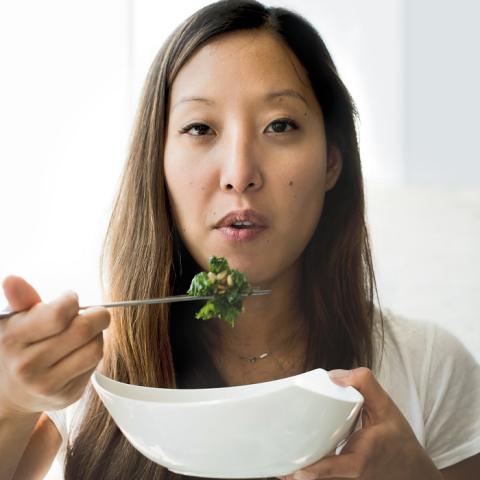UChicago Magazine Has a Mealtime Conversation with the ‘Korean Vegan’—Joanne Lee Molinaro, ’04
Recipe for success
In September 2020, Joanne Lee Molinaro, JD’04, jokingly told her followers, “You have to stop crying at my TikToks. Like, seriously, it’s just a cooking video.”
On TikTok for less than two months, she’d already become a viral sensation, largely because her posts are more than “just” cooking videos. In eloquent voiceovers, Molinaro invites viewers into her kitchen, her home, and her life. Whether she’s talking about her parents’ experiences emigrating from North Korea to South Korea, her own upbringing in America, or her personal philosophy, she is open, compassionate, and unapologetically opinionated—all while preparing vegan dishes, most of them updating the Korean cuisine she grew up with.
In one post that has 2.5 million views to date, she tells a story about her mother defending her from a fat-shaming woman in a store, while on video she makes a noodle dish called japchae. In another, she recounts her dad’s support of her divorce as she prepares a spicy tofu dish: nine million views. (She has since remarried; her husband, pianist Anthony Molinaro, is another frequent topic and occasional guest, and his music often accompanies the videos.)
Soon Molinaro was more than a partner in a law firm with a fun side hustle. As the Korean Vegan, she introduced staples like gochujang, a spicy chili paste, and tteokbokki, chewy rice cakes, to both vegans and nonvegans whose knowledge of Korean food ended at kimchi and barbecue. Viewers familiar with the cuisine learned from her that jjajangmyun, a noodle dish with black bean sauce that happens to be Molinaro’s favorite, could be made without pork, and that gamjatang—literally, “potato stew”—could focus on the potatoes instead of the meat.
There’s no telling where Molinaro will venture with each new post. Her childhood, family, and running are frequent subjects, but she’s caused a stir with episodes about politics, racism, and disordered eating. The one (near) constant—whether she’s speaking as herself or in character as Gomoh, a Korean auntie—is food.
Read more at UChicago Magazine
